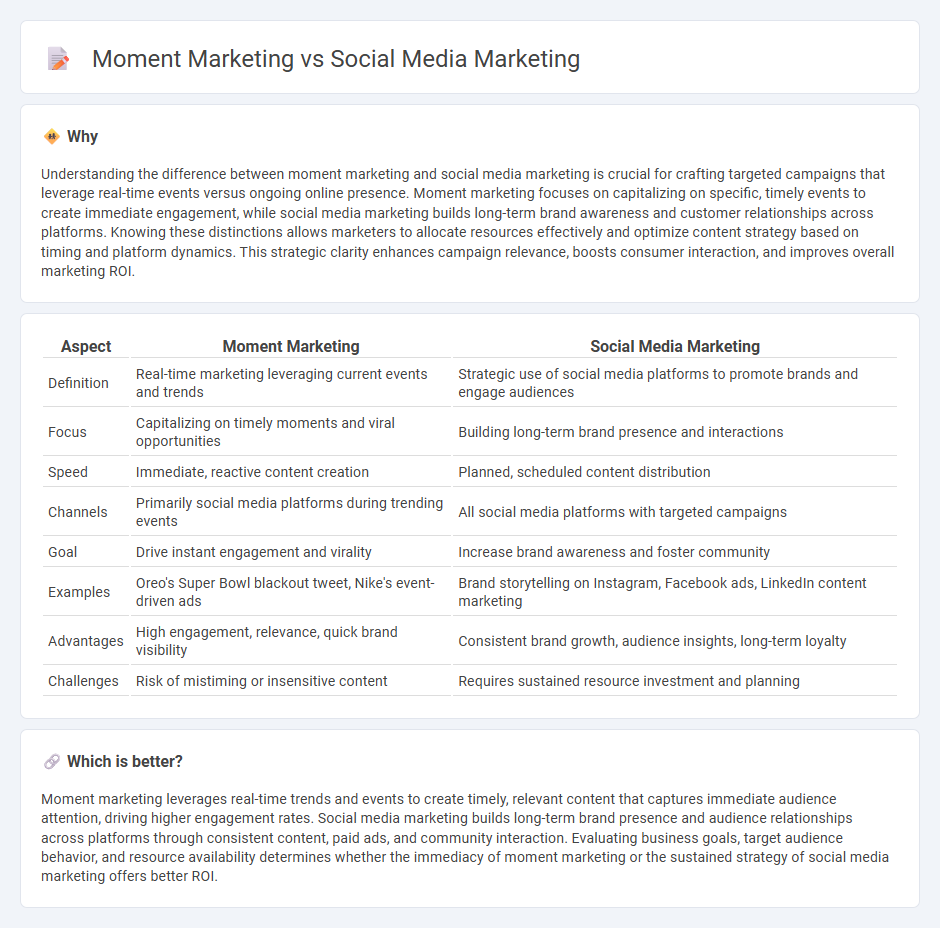
Moment marketing leverages real-time events to create timely, contextually relevant content that engages audiences instantly, while social media marketing focuses on building long-term brand presence through strategic content distribution across various platforms. Both approaches utilize digital channels but differ in immediacy and messaging strategy to drive consumer interaction and brand visibility. Explore deeper insights to optimize marketing strategies for maximum impact.
Why it is important
Understanding the difference between moment marketing and social media marketing is crucial for crafting targeted campaigns that leverage real-time events versus ongoing online presence. Moment marketing focuses on capitalizing on specific, timely events to create immediate engagement, while social media marketing builds long-term brand awareness and customer relationships across platforms. Knowing these distinctions allows marketers to allocate resources effectively and optimize content strategy based on timing and platform dynamics. This strategic clarity enhances campaign relevance, boosts consumer interaction, and improves overall marketing ROI.
Comparison Table
| Aspect | Moment Marketing | Social Media Marketing |
|---|---|---|
| Definition | Real-time marketing leveraging current events and trends | Strategic use of social media platforms to promote brands and engage audiences |
| Focus | Capitalizing on timely moments and viral opportunities | Building long-term brand presence and interactions |
| Speed | Immediate, reactive content creation | Planned, scheduled content distribution |
| Channels | Primarily social media platforms during trending events | All social media platforms with targeted campaigns |
| Goal | Drive instant engagement and virality | Increase brand awareness and foster community |
| Examples | Oreo's Super Bowl blackout tweet, Nike's event-driven ads | Brand storytelling on Instagram, Facebook ads, LinkedIn content marketing |
| Advantages | High engagement, relevance, quick brand visibility | Consistent brand growth, audience insights, long-term loyalty |
| Challenges | Risk of mistiming or insensitive content | Requires sustained resource investment and planning |
Which is better?
Moment marketing leverages real-time trends and events to create timely, relevant content that captures immediate audience attention, driving higher engagement rates. Social media marketing builds long-term brand presence and audience relationships across platforms through consistent content, paid ads, and community interaction. Evaluating business goals, target audience behavior, and resource availability determines whether the immediacy of moment marketing or the sustained strategy of social media marketing offers better ROI.
Connection
Moment marketing leverages real-time events and trending topics to create timely, relevant content that resonates with audiences, amplifying engagement on social media platforms. Social media marketing provides the ideal channels for moment marketing campaigns, enabling brands to instantly share content and interact with users during peak interest periods. The synergy between moment marketing and social media marketing drives higher brand visibility, increased organic reach, and enhanced consumer connection through timely and contextually relevant messaging.
Key Terms
**Social Media Marketing:**
Social media marketing leverages platforms like Facebook, Instagram, and Twitter to create targeted campaigns that engage specific audiences through consistent content and paid advertisements, driving brand awareness and customer loyalty. It emphasizes strategic content planning, audience analytics, and sustained interaction to build long-term relationships and measurable ROI. Discover how integrating social media marketing into your business strategy can elevate brand presence and customer engagement.
Engagement
Social media marketing leverages consistent, targeted content to build brand awareness and foster long-term audience engagement across platforms like Facebook, Instagram, and Twitter. Moment marketing capitalizes on real-time events or trends, creating timely, relevant content that sparks immediate interaction and viral potential. Explore deeper insights to optimize your engagement strategies effectively.
Content Strategy
Social media marketing prioritizes consistent content creation tailored to audience interests and platform algorithms, aiming to build brand awareness and engagement over time. Moment marketing targets real-time events or trends to create timely, relevant content that capitalizes on current audience attention, often leading to increased virality and immediate impact. Explore how integrating both strategies can optimize your content approach and maximize marketing effectiveness.
Source and External Links
Social media marketing (SMM) meaning: Productsup Glossary - Social media marketing involves using platforms like Instagram, Facebook, and TikTok to connect with audiences, build brands, increase sales, and drive website traffic by posting engaging content and fostering online communities.
How to Build Your Social Media Marketing Strategy: Sprout Social - Social media marketing is the practice of promoting brands, products, or services on platforms such as Instagram, X (Twitter), and Facebook through content creation, customer interaction, and influencer partnerships to boost engagement and sales.
What is a social media marketing strategy?: Adobe Business - A successful social media marketing strategy requires setting clear goals, tracking KPIs, optimizing influencer collaborations, leveraging AI for content and analytics, and regularly proving ROI through detailed reporting to align efforts with business objectives.
 dowidth.com
dowidth.com